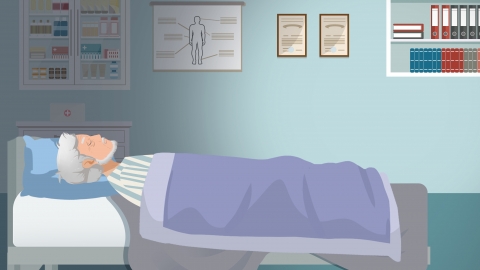Why do elderly people with cerebral infarction cry out at night?
Cerebral infarction refers to cerebral infarction. Nocturnal shouting in elderly patients with cerebral infarction may be caused by sleep-wake cycle disturbances, pain, vascular dementia, pulmonary infection, urethritis, etc., and can be managed according to the specific situation. If physical discomfort occurs, it is recommended to seek medical attention promptly and follow medical advice for management.

1. Sleep-wake cycle disturbances: Cerebral infarction may affect the normal brain function in elderly patients, disrupting the original sleep-regulating mechanisms and leading to disturbances in the sleep cycle. The elderly may experience excessive daytime sleepiness and increased alertness at night, resulting in shouting. Family members should spend time accompanying and engaging the elderly during the day, and create a quiet and comfortable sleeping environment at night, such as dimming lights and maintaining a suitable indoor temperature, to gradually adjust the sleep cycle.
2. Pain: Cerebral infarction may cause limb numbness and pain, or pressure ulcers due to prolonged bed rest. The elderly may be more sensitive to pain in the quiet nighttime environment, leading to shouting. Family members should regularly assist the elderly in turning over, provide massage, and check skin condition to prevent pressure ulcers.
3. Vascular dementia: Some elderly patients with cerebral infarction may develop vascular dementia, experiencing cognitive decline and abnormal mental behaviors. At night, they may feel fear and shout due to disorientation regarding day and night or inability to find familiar surroundings. It is recommended to use medications such as donepezil tablets, rivastigmine capsules, and oxiracetam capsules under medical guidance to improve cognitive function.
4. Pulmonary infection: The immunity of elderly patients with cerebral infarction is reduced, and prolonged bed rest may easily lead to pulmonary infection. Inflammatory stimulation may cause coughing, sputum production, and dyspnea, with symptoms worsening at night, causing the patient to shout. Patients may use medications such as amoxicillin capsules, ambroxol hydrochloride oral solution, and aminophylline tablets under medical guidance to alleviate symptoms.
5. Urethritis: Due to long-term indwelling urinary catheters or poor personal hygiene, elderly patients are prone to urinary tract infections, leading to urethritis with symptoms such as frequent urination, urgency, and dysuria, which may disturb sleep at night and cause shouting. Attention should be paid to perineal hygiene, and patients may use medications such as levofloxacin tablets, Sanjin tablets, and sodium bicarbonate tablets according to medical advice.
In daily life, family members should spend more time with the elderly, provide emotional support, place familiar items in the room, and enhance the patient's sense of security.




